| Listing 1 - 10 of 15 | << page >> |
Sort by
|
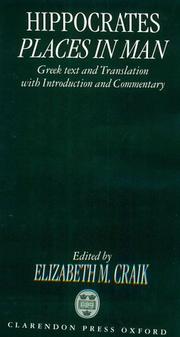
ISBN: 0198152272 Year: 1998 Publisher: Oxford : Clarendon Press,
Abstract | Keywords | Export | Availability | Bookmark
 Loading...
Loading...Choose an application
- Reference Manager
- EndNote
- RefWorks (Direct export to RefWorks)
Geneeskunde [Griekse ] --- Geneeskunde [Griekse en Romeinse ] --- Geneeskunde [Romeinse ] --- Greek and Roman medicine --- Griekse en Romeinse geneeskunde --- Medicine [Greek ] --- Medicine [Greek and Roman ] --- Medicine [Roman ] --- Médecine grecque --- Médecine grecque et romaine --- Médecine romaine --- Hippocrates --- Medicine, Greek and Roman. --- Spurious and doubtful works. --- Médecine grecque et romaine
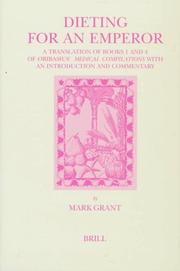
ISBN: 9004107908 9004377425 Year: 1997 Volume: 15 Publisher: Leiden : E.J. Brill,
Abstract | Keywords | Export | Availability | Bookmark
 Loading...
Loading...Choose an application
- Reference Manager
- EndNote
- RefWorks (Direct export to RefWorks)
The commentary indicates Oribasius' source for each quotation or paraphrase, assesses the accuracy and comprehensibility of the contents, and suggests the reasons behind the recommendations and rejections of certain cakes, breads, fruits and vegetables. To aid further research in the field of ancient dietetics, a detailed word index is appended. The introduction summarises the more important points about the medical theories behind the humours and qualities, and how regulating the intake of foods could assist in the maintenance of good health.
Geneeskunde [Griekse ] --- Geneeskunde [Griekse en Romeinse ] --- Geneeskunde [Romeinse ] --- Greek and Roman medicine --- Griekse en Romeinse geneeskunde --- Medicine [Greek ] --- Medicine [Greek and Roman ] --- Medicine [Roman ] --- Médecine grecque --- Médecine grecque et romaine --- Médecine romaine --- Dietetics - Early works to 1800. --- Dietetics --- Medicine, Greek and Roman. --- Dietetics. --- Greek medicine --- Medicine, Roman --- Medicine, Unani --- Roman medicine --- Tibb (Medicine) --- Unani medicine --- Unani-Tibb (Medicine) --- Medicine, Ancient --- Nutrition --- Oribasius. --- Synagōgai iatrikai (Oribasius) --- Medical compilations (Oribasius) --- Collectorum medicinalium (Oribasius) --- Collecta medicinalia (Oribasius)
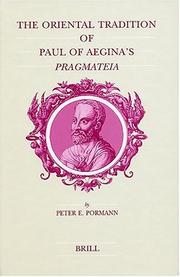
ISBN: 9004137572 9789004137578 904741389X Year: 2004 Volume: 29 Publisher: Leiden : Brill,
Abstract | Keywords | Export | Availability | Bookmark
 Loading...
Loading...Choose an application
- Reference Manager
- EndNote
- RefWorks (Direct export to RefWorks)
The volume investigates how Paul of Aegina's medical handbook or pragmateia was transmitted and transformed through Syriac and Arabic translations, becoming one of the cornerstones of the Islamic medical tradition. It uses new manuscript evidence in order to explore the crucial impact of Paul's pragmateia , tracing its steps through different languages and cultures in the Middle East. A discussion of different Syriac and Arabic authors who quote the pragmateia such as Ibn Serapion and Rhazes is followed by detailed studies of Greek-Syriac-Arabic translation technique, examining, for instance, ophthalmologic terminology, and giving a critical appraisal of translation syntax and lexicography. Paul's influence on the development of medical theory in the Islamic world and beyond is also addressed, making it an important contribution not only to Graeco-Arabic studies, but also to the history of medicine in general.
Arab medicine --- Geneeskunde [Arabische ] --- Geneeskunde [Griekse ] --- Geneeskunde [Griekse en Romeinse ] --- Geneeskunde [Romeinse ] --- Greek and Roman medicine --- Griekse en Romeinse geneeskunde --- Medecine arabe --- Medicine [Arab ] --- Medicine [Arabic ] --- Medicine [Greek ] --- Medicine [Greek and Roman ] --- Medicine [Roman ] --- Médecine grecque --- Médecine grecque et romaine --- Médecine romaine --- Medicine, Greek and Roman. --- Medicine, Arab. --- Paulus, --- Paulus Aegineta --- Greek medicine --- Medicine, Roman --- Medicine, Unani --- Roman medicine --- Tibb (Medicine) --- Unani medicine --- Unani-Tibb (Medicine) --- Medicine, Ancient --- Medicine, Arabic --- Medicine, Medieval --- Medicine, Arab --- De re medica (Paulus, Aegineta) --- Pragmateia (Paulus, Aegineta)
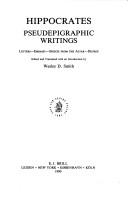
ISBN: 9004092900 9004377204 Year: 1990 Volume: 2 Publisher: Leiden : Brill,
Abstract | Keywords | Export | Availability | Bookmark
 Loading...
Loading...Choose an application
- Reference Manager
- EndNote
- RefWorks (Direct export to RefWorks)
The biography and personality of the 'Father of Medicine' were known to the world through these important, but little studied letters and speeches. W.D. Smith here presents them newly edited from the most important manuscripts, with a facing English translation, and offers an introduction that gives a literary analysis and places them in relation to ancient history and ancient medical science. The speeches appear to be early (III B.C.) propaganda for the Island Cos, whose presence in the Library at Alexandria contributed to the characterization of the Hippocratic Corpus, while the Democritus Letters belong to the Roman period, after the firm establishment of Hippocrates' reputation.
Geneeskunde [Griekse ] --- Geneeskunde [Griekse en Romeinse ] --- Geneeskunde [Romeinse ] --- Greek and Roman medicine --- Griekse en Romeinse geneeskunde --- Medicine [Greek ] --- Medicine [Greek and Roman ] --- Medicine [Roman ] --- Médecine grecque --- Médecine grecque et romaine --- Médecine romaine --- Medicine, Greek and Roman --- Hippocrates --- Spurious and doubtful works --- Ouvrages contrefaits et apocryphes --- Medicine, Greek and Roman. --- Médecine grecque et romaine --- Greek medicine --- Medicine, Roman --- Medicine, Unani --- Roman medicine --- Tibb (Medicine) --- Unani medicine --- Unani-Tibb (Medicine) --- Medicine, Ancient --- Hippocrates. --- Abuqrā --- Hipócrates --- Hippocrate --- Hippocrates, --- Hippokrates --- Ipoḳrat --- Ippocrate --- Ypocras --- Abuqrāṭ --- היפוקראטס --- بقراط --- Spurious and doubtful works.
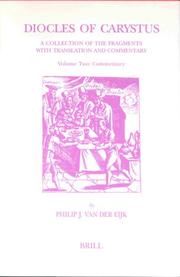
ISBN: 9004120122 9004102655 9004120130 9004377506 9004377492 9789004120136 9789004120129 9789004102651 Year: 2000 Volume: 22, 23 Publisher: Leiden : Brill,
Abstract | Keywords | Export | Availability | Bookmark
 Loading...
Loading...Choose an application
- Reference Manager
- EndNote
- RefWorks (Direct export to RefWorks)
Diocles of Carystus (4th century BCE), also known as 'the younger Hippocrates', was one of the most prominent medical authorities in antiquity. He wrote extensively on a wide range of areas such as anatomy, physiology, pathology, therapeutics, embryology, gynaecology, dietetics, foods and poisons. In his writings, he betrays strong philosophical influence, and his views present striking connections with the Hippocratic Corpus, Plato, Aristotle and Theophrastus. The study of Diocles' ideas has long been hampered by the absence of a reliable collection of the remaining evidence. This book presents and discusses all the fragments and testimonies to Diocles' views. The first volume presents the Greek, Latin and Arabic sources with facing English translation. The second volume (publication April 2001) provides a commentary on the fragments and places them in their intellectual context.
Geneeskunde [Griekse ] --- Geneeskunde [Griekse en Romeinse ] --- Geneeskunde [Romeinse ] --- Greek and Roman medicine --- Griekse en Romeinse geneeskunde --- Medicine [Greek ] --- Medicine [Greek and Roman ] --- Medicine [Roman ] --- Médecine grecque --- Médecine romaine --- Diocles, --- Greek medicine --- Medicine, Roman --- Roman medicine --- Medicine, Ancient --- Diocles of Carystus --- Macroscopic, incl. comparative --- Greek-roman --- 460bc-576ad --- Macroscopic, incl. comparative. --- 460bc-576ad. --- Medicine, Greek and Roman --- Medicine, Unani --- Tibb (Medicine) --- Unani medicine --- Unani-Tibb (Medicine) --- Anatomy --- Embryology. --- History of medicine --- Medicine, Greek and Roman. --- Obstetrics. --- Physiology. --- Médecine grecque et romaine --- Diocles, - of Carystus. --- Diocles, - of Carystus
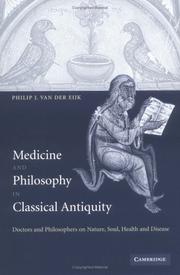
ISBN: 0521818001 0521142970 9786610434466 0511181337 0511197977 0511113293 0511326750 0511482671 1280434465 0511112785 1107135168 9780521818001 Year: 2005 Publisher: Cambridge, UK ; New York : Cambridge University Press,
Abstract | Keywords | Export | Availability | Bookmark
 Loading...
Loading...Choose an application
- Reference Manager
- EndNote
- RefWorks (Direct export to RefWorks)
This work brings together Philip van der Eijk's previously published essays on the close connections that existed between medicine and philosophy throughout antiquity. Medical authors such as the Hippocratic writers, Diocles, Galen, Soranus and Caelius Aurelianus elaborated on philosophical methods such as causal explanation, definition and division and applied key concepts such as the notion of nature to their understanding of the human body. Similarly, philosophers such as Plato and Aristotle were highly valued for their contributions to medicine. This interaction was particularly striking in the study of the human soul in its relation to the body, as illustrated by approaches to specific topics such as intellect, sleep and dreams, and diet and drugs. With a detailed introduction surveying the subject as a whole and an essay on Aristotle's treatment of sleep, this wide-ranging and accessible collection is essential reading for the student of ancient philosophy and science.
Ame --- Ancient medicine --- Antieke geneeskunde --- Geneeskunde [Antieke ] --- Geneeskunde [Griekse ] --- Geneeskunde [Griekse en Romeinse ] --- Geneeskunde [Romeinse ] --- Geneeskunde van de Oudheid --- Greek and Roman medicine --- Griekse en Romeinse geneeskunde --- Medicine [Ancient ] --- Medicine [Greek ] --- Medicine [Greek and Roman ] --- Medicine [Roman ] --- Médecine ancienne --- Médecine de l'Antiquité --- Médecine grecque --- Médecine grecque et romaine --- Médecine romaine --- Nature --- Natuur --- Soul --- Ziel --- Arts and Humanities --- History --- Medicine, Ancient --- Medicine, Greek and Roman --- Medicine --- Pneuma --- Future life --- Philosophical anthropology --- Theological anthropology --- Animism --- Spirit --- Medical logic --- Greek medicine --- Medicine, Roman --- Medicine, Unani --- Roman medicine --- Tibb (Medicine) --- Unani medicine --- Unani-Tibb (Medicine) --- Philosophy --- Medicine, Greek and Roman. --- Medicine, Ancient. --- Soul. --- Nature. --- Philosophy. --- Health Workforce --- Medicine - Philosophy.
Book
ISBN: 2907303260 9782907303262 Year: 1999 Volume: 7 Publisher: Montagnac : Ed. Monique Mergoil,
Abstract | Keywords | Export | Availability | Bookmark
 Loading...
Loading...Choose an application
- Reference Manager
- EndNote
- RefWorks (Direct export to RefWorks)
Geneeskunde [Griekse ] --- Geneeskunde [Griekse en Romeinse ] --- Geneeskunde [Romeinse ] --- Greek and Roman medicine --- Griekse en Romeinse geneeskunde --- Medicine [Greek ] --- Medicine [Greek and Roman ] --- Medicine [Roman ] --- Médecine grecque --- Médecine grecque et romaine --- Médecine romaine --- Ophthalmolgists --- Ophthalmology --- Inscriptions, Latin --- Ophtalmologues --- Ophtalmologie --- Inscriptions latines --- History --- Sources --- Catalogs --- Histoire --- Catalogues --- Seals (Numismatics) --- Eye --- Ophthalmic drugs --- Medicine, Greek and Roman --- Diseases --- Treatment --- Rome --- Antiquities --- Oculists' stamps --- Collyrium stamps --- Sigillography --- Signets --- Sphragistics --- Diplomatics --- Glyptics --- Heraldry --- Inscriptions --- Intaglios --- Numismatics --- Emblems, National --- Signatures (Writing) --- Greek medicine --- Medicine, Roman --- Medicine, Unani --- Roman medicine --- Tibb (Medicine) --- Unani medicine --- Unani-Tibb (Medicine) --- Medicine, Ancient --- Latin inscriptions --- Latin language --- Latin philology --- Materia medica, Ophthalmological --- Ophthalmic agents --- Drugs --- Therapeutics, Ophthalmological --- Ocular pharmacology --- Eyeball --- Eyes --- Visual system --- Face --- Photoreceptors --- Vision --- Rim --- Roman Empire --- Roman Republic (510-30 B.C.) --- Romi (Empire) --- Byzantine Empire --- Rome (Italy) --- Inscriptions [Latin ] --- Seals (Numismatics) - Rome - Catalogs --- Inscriptions, Latin - Catalogs --- Eye - Diseases - Treatment - Rome --- Ophthalmic drugs - Rome - History --- Rome - Antiquities - Catalogs --- Cachets à collyres --- Ophtalmologistes --- Sceaux --- Europe --- Inventaires
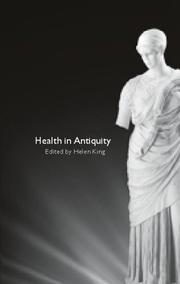
ISBN: 0415220653 9780415486934 0415486939 9780415220651 9780203323847 9781134599684 9781134599721 9781134599738 Year: 2005 Publisher: London ; New York, NY : Routledge,
Abstract | Keywords | Export | Availability | Bookmark
 Loading...
Loading...Choose an application
- Reference Manager
- EndNote
- RefWorks (Direct export to RefWorks)
Is health the absence of disease, or a more positive state of happiness and well-being? How healthy were people in ancient Greece and Rome, and how did they think about maintaining and restoring their health? Answers to these and many previously untouched questions are dealt with by renowned ancient historians, classical scholars, and archaeologists. Using a multi-disciplined approach, the contributors assess the issues surrounding health in the Greco-Roman world from prehistory to Christian late antiquity.
Ancient civilization --- Antieke beschaving --- Antieke cultuur --- Beschaving [Antieke ] --- Beschaving van de oudheid --- Civilisation ancienne --- Civilisation de l'antiquité --- Civilization [Ancient ] --- Cultuur [Antieke ] --- Diseases and history --- Geneeskunde [Griekse ] --- Geneeskunde [Griekse en Romeinse ] --- Geneeskunde [Romeinse ] --- Geschiedenis van de geneeskunde van de Oudheid --- Greek and Roman medicine --- Griekse en Romeinse geneeskunde --- Histoire de la médecine de l'antiquité --- History of medicine [Ancient ] --- Maladies et histoire --- Medicine [Greek ] --- Medicine [Greek and Roman ] --- Medicine [Roman ] --- Médecine grecque --- Médecine grecque et romaine --- Médecine romaine --- Ziekten en geschiedenis --- Health --- Medicine, Greek and Roman. --- Diseases and history. --- Santé --- History --- Histoire --- Greek World. --- History, Ancient. --- History of Medicine. --- Roman World. --- Santé --- Médecine grecque et romaine --- Medicine, Greek and Roman --- Greek medicine --- Medicine, Roman --- Medicine, Unani --- Roman medicine --- Tibb (Medicine) --- Unani medicine --- Unani-Tibb (Medicine) --- Medicine, Ancient --- Diseases --- History and diseases --- Influence on history --- History.
Book
ISBN: 8822233468 Year: 1985 Volume: vol 74 Publisher: Firenze : Olschki,
Abstract | Keywords | Export | Availability | Bookmark
 Loading...
Loading...Choose an application
- Reference Manager
- EndNote
- RefWorks (Direct export to RefWorks)
Geneeskunde [Griekse ] --- Geneeskunde [Griekse en Romeinse ] --- Geneeskunde [Romeinse ] --- Greek and Roman medicine --- Griekse en Romeinse geneeskunde --- Medicine [Greek ] --- Medicine [Greek and Roman ] --- Medicine [Roman ] --- Médecine grecque --- Médecine grecque et romaine --- Médecine romaine --- Logic, Ancient --- Negation (Logic) --- Medicine, Greek and Roman --- Manuscripts, Greek (Papyri) --- Papyrus grecs --- Manuscripts --- Early works to 1800 --- 091.141 --- 091 =75 --- 16 --- 091:1 --- 091:61 --- -Negative propositions --- Judgment (Logic) --- Greek medicine --- Medicine, Roman --- Medicine, Unani --- Roman medicine --- Tibb (Medicine) --- Unani medicine --- Unani-Tibb (Medicine) --- Medicine, Ancient --- Greek papyri --- Papyri, Greek --- Manuscripts, Classical (Papyri) --- Manuscripts (Papyri) --- Ancient logic --- Papyri --- Handschriftenkunde. Handschriftencatalogi--Grieks --- Logica. Kennistheorie. Logische methodiek. Wetenschapsfilosofie --- Handschriften i.v.m. wijsbegeerte --- Handschriften i.v.m. geneeskunde --- History --- 091:61 Handschriften i.v.m. geneeskunde --- 091:1 Handschriften i.v.m. wijsbegeerte --- 16 Logica. Kennistheorie. Logische methodiek. Wetenschapsfilosofie --- 091 =75 Handschriftenkunde. Handschriftencatalogi--Grieks --- 091.141 Papyri --- -Papyri --- -Greek medicine --- Negative propositions --- Manuscrits --- Médecine grecque et romaine --- Manuscripts [Greek ] (Papyri) --- Addresses, essays, lectures --- Logic [Ancient ] --- 16 Logic. Epistemology. Theory of knowledge. Methodology of logic --- Logic. Epistemology. Theory of knowledge. Methodology of logic

ISBN: 0198242484 9780198242482 0191680486 Year: 1990 Publisher: Oxford : Clarendon press,
Abstract | Keywords | Export | Availability | Bookmark
 Loading...
Loading...Choose an application
- Reference Manager
- EndNote
- RefWorks (Direct export to RefWorks)
Ancient philosophy --- Antieke filosofie --- Filosofie [Antieke ] --- Filosofie [Griekse ] --- Filosofie [Romeinse ] --- Filosofie van de Oudheid --- Geneeskunde [Griekse ] --- Geneeskunde [Griekse en Romeinse ] --- Geneeskunde [Romeinse ] --- Greek and Roman medicine --- Greek philosophy --- Griekse en Romeinse geneeskunde --- Griekse filosofie --- Medicine [Greek ] --- Medicine [Greek and Roman ] --- Medicine [Roman ] --- Médecine grecque --- Médecine grecque et romaine --- Médecine romaine --- Philosophie ancienne --- Philosophie antique --- Philosophie de l'Antiquité --- Philosophie grecque --- Philosophie romaine --- Philosophy [Ancient ] --- Philosophy [Greek ] --- Philosophy [Roman ] --- Roman philosophy --- Romeinse filosofie --- Medicine --- Medicine, Greek and Roman --- Médecine --- Philosophy --- Philosophie --- Asclepiades, --- Medicine, Greek and Roman. --- Philosophy, Ancient. --- Philosophy. --- History, Ancient. --- Philosophy, Medical --- Physicians --- -Medicine, Greek and Roman --- Philosophy, Ancient --- Philosophy, Greek --- Philosophy, Roman --- Greek medicine --- Medicine, Roman --- Medicine, Unani --- Roman medicine --- Tibb (Medicine) --- Unani medicine --- Unani-Tibb (Medicine) --- Medicine, Ancient --- Clinical sciences --- Medical profession --- Human biology --- Life sciences --- Medical sciences --- Pathology --- Ancient History (Medicine) --- Ancient History of Medicine --- History of Medicine, Ancient --- Medicine, Ancient History --- Ancient History --- Ancient Histories (Medicine) --- Ancient History Medicine --- Ancient History Medicines --- Histories, Ancient (Medicine) --- History Medicine, Ancient --- History Medicines, Ancient --- History, Ancient (Medicine) --- Medicine Ancient History --- Medicines, Ancient History --- history. --- Asclepiades of Bithynia --- Médecine --- Médecine grecque et romaine --- History, Ancient --- Medical logic --- history --- Asclepiade, --- Asclepiades Bithynus --- Asclepiades, of Bithynia, ca. 130-ca. 40 B. C. --- Medicine - Philosophy. --- Health Workforce --- Asklepiades,
| Listing 1 - 10 of 15 | << page >> |
Sort by
|

 Search
Search Feedback
Feedback About UniCat
About UniCat  Help
Help News
News